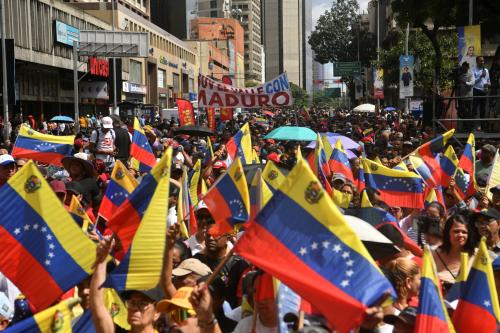Benin is the new field of dreams and promises kept.
In a year when many countries on the continent are changing their constitutions to allow for incumbent presidents to run yet again, Benin, under President Yayi Boni, is respecting the term limits set down in its constitution. Thanks in part to pressure from the population, this development is allowing for political and democratic change. Indeed, the second round of elections took place on Sunday, between Prime Minister Lionel Zinsou and cotton magnate Patrice Talon who won 27.1 percent and 23.5 percent of the first round votes, respectively. In the second round Patrice Talon is believed to have won with a provisional margin of about 65 percent. Official certification from the Supreme Court is still pending, but Lionel Zinsou has publicly conceded.
These elections prove that Benin is consolidating its political transitions process. It joins many other African countries such as Ghana, Nigeria, Kenya, Namibia, Zambia, and Tanzania in respecting their constitutions, continuing the process of political transition, and supporting institution building. With a total of 20 leadership transitions (defined as a change in the ruler/president of the country) overall since Benin’s independence, the last five have been contested multi-party elections. Sunday’s election is the sixth successive multiparty contest since 1991 with three complete, democratic leadership transitions—from Nicephore Soglo in 1991, to Mathieu Kerekou in 1996, to Yayi Boni in 2006. Benin is unique: Only six African countries have similar records. Ghana, Mozambique, Namibia, Mauritius, Cape Verde, and Malawi have succeeded in having three uninterrupted peaceful leadership transitions over the last 20-25 years with two-term presidents.
Benin’s success comes with a number of electoral innovations that are challenging the status quo and could have important implications for the rest of the continent in the future.
Incumbents plan for succession
In this election, Benin’s politicians attempted at succession planning, albeit tentative in many ways. Africa has more often witnessed presidents that tend to undermine the aspirations of their cabinet and government members creating a leadership vacuum around them, which generally paves the way for them changing the constitution to run again. In Benin, however, outgoing President Boni appointed Lionel Zinsou Prime Minister in June 2015, following a two-year vacancy of the job to provide him with a platform to prepare for the elections. In December 2015, Zinsou announced his candidacy for the presidency of the republic, endorsed by Boni. The nomination and endorsement of Zinsou by the president creates a potentially welcome precedent.
Technocrats and business moguls enter politics
Second, the diverse nature of the candidates and the influence of the private sector:
For the first time on the continent over the last three decades we will have two candidates vying for the highest public office who have spent the majority of their careers in the private sector. While private sector actors have traditionally played a more backseat role, funding campaigns or influencing the choice and direction of policy, they have rarely had their names on the ballot. In most countries technocrats, defined as specialists especially in the public policy field, have shied away from politics.
Of the 33 original candidates in the first round, the top five candidates comprised one of the most technocratic short lists of presidential candidates possibly ever seen on the continent. The list included two prime ministers (one current and one former), Zinsou (formerly the head of French private equity firm PAI Partners) and Koupaki; two independent and wealthy candidates, Talon the cotton baron of Benin and Adjavon, the poultry baron; and two former IMF and West African Central Bank senior managers, Bio Tchane and Koupaki (again). Zinsou worked for the French government as adviser to the foreign minister while Koupaki also worked as advisor to President Alassane Ouattara of Côte d’Ivoire in the past. The choices for the population were between successful international technocrats or extremely successful businessmen. Choices like these are not generally available to populations on the continent. The diverse line-up in Benin could mean that once leadership transitions are institutionalized and populations’ belief in the transparency and governance of the process is established, more robust candidates are willing and prepared to participate in the process, which until now could mean jail, exile, or torture for anyone out of the ruling party.
The voice of the diaspora grows
This election saw a growing involvement of the diaspora in politics: The role and importance of the diaspora in leadership transitions on the continent remains a thorny issue in many countries. While increasingly more countries make it possible for the diaspora to vote in elections, the majority of countries do not. Benin’s constitution was amended in 1995 to allow candidates with dual citizenship to stand for elections and for the diaspora to vote in elections. There are over 4 million Beninois that leave outside of Benin, mostly in other African countries like Nigeria, France and the U.S. The diaspora generally is associated with opposition parties and hence incumbent parties tend to be suspicious of them. However as the number and frequency of multiparty transitions increases all political parties are increasingly courting the diaspora and in some countries the diaspora is represented in the parliament. In the case of Benin, Zinsou, Koupaki, and Bio Tchane—among the top five candidates—all emanate from the diaspora. They spent most of their professional lives abroad working for international organizations, doing business, or serving other functions.
What possible implications could these developments have for African politics?
These welcome trends imply that African leadership transition institutions are maturing. Leadership positions are moving from being occupied by professional politicians and the military to technocrats, professionals, and the private sector, thanks to a more open and participatory process. The continent has moved from a place where civil society (including the private sector) could only speak up through riots and street protests to one where they can play a direct role in the leadership transition process. From Burkina Faso to Kenya to Benin, the continent is maturing, despite setbacks in places like Burundi.
Second, political platforms and second-round elections will continue to be important to the future of the leadership transition process. In Benin, while the incumbent party benefited from a well-organized party process, and the candidate had the support of the organized political parties through successful succession planning, 22 opposition candidates had a loosely defined coalition, called the “rupture alliance,” aimed at improving governance in the country and stopping the progression of the incumbent party candidate. The two wealthy private sector candidates Talon and Adjavon ran as independents with no party apparatus. With a second round, the losing candidates are obliged to organize themselves into a more organized and homogeneous structure as they throw their voices behind either of the top two candidates. This process helps build institutions and strengthen the leadership transition process, providing clear choices to the population and obliging the last two candidates to improve the messages and choices they offer. As African countries move from uncontested one-party elections to more contestability, this sequential process will help build alternative coalitions and form the bases for genuine political party development over time. Moving from a loose coalition of people to a coalition of people with like-minded public policy positions will essentially mature the participatory process.
Third, the new makeup of the candidate field is changing the amount and composition of election spending. There is no spending limit for elections in most African countries. In a country with a GDP per capita of $800, poverty remains high and free handouts in cash or kind can sway votes. In most elections, the incumbent party has the most resources. It has access to national resources and can dominate the campaign scene. In fact, an IMF study by Ebeke and Ölçer, Fiscal policy over the election cycle in low income countries (2013) showed that government consumption significantly increases during election years, normally because incumbents vying for a new mandate use the public purse for the election. While increasingly many countries budget for and provide some resources to all candidates, these resources are a small fraction of what is spent by the incumbent ruling party.
In Benin, with two of the richest private sector contenders vying for the presidency, the cost of the first round of elections was high. Candidates spent usually large sums to get out the vote. Both Adjavon and Talon, self-made millionaires, had their own money to use for the elections. It is clear that the overall cost of the election went up as the war chest of the private sector candidates was comparable to that of the incumbent party candidate. Further analysis is needed to see if such massive private sector funding of the election substantially increased the share of public sector consumption. If this phenomenon were to continue then there will be a need to focus more on campaign finance on the continent. However, in this case, it also helped put candidates on equal footing with the incumbent party candidate. With similar financial resources, the two private sector candidates came very close to the incumbent with 27.3 percent for the incumbent party, 23.5 and 22.1 for both private sector candidates, Talon and Adjavon, respectively.
Fourth, there is a place for the diaspora in African politics. Increasingly on the continent countries like Côte d’Ivoire, Liberia, Kenya, Mali, Burkina Faso, and Nigeria are leveraging their diaspora to serve within the government. There are increasingly more ministers and prime ministers from the diaspora in African governments. However, the appetite for having a president from the diaspora is not yet widespread. Côte d’Ivoire and Liberia are the most common examples of this. Zinsou’s strong showing after the first round implies that populations may be more willing to consider diaspora candidates than they have previously been. In countries with a substantial part of the population outside the country this could be an important development as it broadens the choices of candidates for the population and should be encouraged. Candidates from the diaspora are often seen, wrongly or rightly, as more willing to tackle difficult policy issues and more willing to tackle corruption.
As the people of Benin prepare to welcome a new president, there are already a number of lessons to draw and learn from. Overall, the Benin experience demonstrates that Africa’s leadership transition process is maturing as strong institutions are being built, and Africa’s processes are converging with the rest of the world in an era where we have politicians and business moguls vying for top public office in many other countries.
The Brookings Institution is committed to quality, independence, and impact.
We are supported by a diverse array of funders. In line with our values and policies, each Brookings publication represents the sole views of its author(s).




Commentary
Benin’s landmark elections: An experiment in political transitions
March 22, 2016